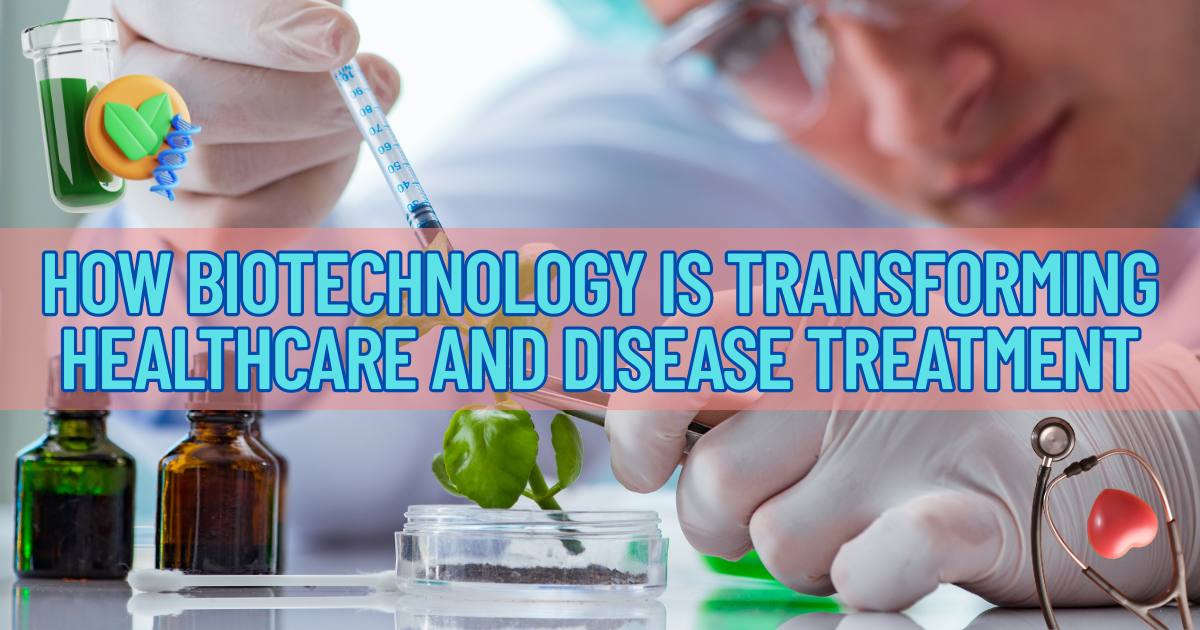How Biotechnology Is Transforming Healthcare and Disease Treatment. Biotechnology is a rapidly evolving field that has the potential to modify and improve healthcare and disease treatment. Biotechnology’s roots date back to ancient times, when humans selected plants for cultivation, domesticated animals, and used microorganisms to produce bread, wine, and beer. But now it has evolved and is able to make improvements in the healthcare sector and find a treatment for the disease. To know more about the topic “How Biotechnology Is Transforming Healthcare and Disease Treatment,” read the complete article.
How Biotechnology Is Transforming Healthcare and Disease Treatment
Biotechnology has transformed medicine by allowing more correct diagnostics, targeted therapeutics, personalized treatment, and preventive healthcare. Key innovations like recombinant DNA technology, genetic engineering, DNA sequencing, polymerase chain reaction, monoclonal antibodies, stem cell therapy and omics sciences have catalyzed this biotechnology revolution in medicine. Biotechnology involves the application of biological knowledge and techniques to develop products and processes that benefit human health.

The new genomic tools emerging from biotechnology have revolutionized medicine and transformed our understanding of health and the provision of healthcare. From cancer research to agricultural advancements, medical biotechnology has many promising avenues of technological growth that have the potential to assist many individuals.
Biotech and AI are a good combination, as they have applications that will assist us in handling challenges from climate change, food security, and energy. The goal, for experts in the sector, is moving from applications that prevent health issues to actual prediction. That is not beyond our imagination at all.
Diagnostics
Advanced Molecular Diagnostics: Molecular diagnostics, based on biotechnology tools, have revolutionized disease detection and monitoring. Techniques such as polymerase chain reaction (PCR), gene sequencing, and microarray analysis allow for the identification and characterization of genetic mutations, pathogens, and biomarkers related to various diseases.
Companion Diagnostics: Companion diagnostics identify patients who are most likely to benefit from a particular therapeutic product. It also identifies patients likely to be at increased risk for serious side effects as a result of treatment with a particular therapeutic product.
Biosensors: Biosensors are now often used for point-of-care monitoring in portable devices. These instruments are used in tissues, microorganisms, organelles, cell receptors, enzymes, antibodies, and nuclear acids to detect a substance in sensitive bioelements. It can track the important signs of a patient and identify biological abnormalities.
Drug Development
Biopharmaceuticals: Biopharmaceuticals derived from biotechnology offer enhanced therapeutics, addressing complex diseases like cancer, autoimmune disorders and genetic conditions. They are medical drugs produced using biotechnology. They are proteins (including antibodies) and nucleic acids (DNA, RNA, or antisense oligonucleotides) used for therapeutic or diagnostic purposes and are produced by means other than direct extraction from a native biological source.
Pharmacogenomics: Pharmacogenomics uses genetic information to determine the most effective and safe medication for an individual, minimizing adverse drug reactions and optimizing treatment efficacy. It enables the development of personalized medicines tailored to an individual’s genetic makeup.
Bioinformatics: Bioinformatics, a discipline that mixes biology and computer science, utilizes information technology to store, analyze, and interpret genomic data. It involves developing algorithms, databases and computation tools to extract valuable insights from genomic data, including identifying disease-causing mutations, predicting drug responses and understanding the genetic basis of diseases.
Gene and Cell Therapies
Gene Therapy: Gene therapy is to cure gene mutations. It is the condition where genes don’t work properly and can cause disease. It aims to fix a faulty gene or replace it with a healthy gene to try to cure disease. It holds promise as a treatment for a wide range of diseases, such as cancer, cystic fibrosis, heart disease, diabetes, hemophilia, and AIDS.
Cell Therapy: Cell therapy is a therapy in which viable cells are injected, grafted, or implanted into a patient in order to effectuate a medical effect, such as by transplanting T-cells capable of fighting cancer cells via cell-mediated immunity in the course of immunotherapy or grafting stem cells to regenerate diseased tissues.
CAR T-cell Therapy: CAR T-cell therapy is an option to treat some blood cancers when other treatments aren’t effective or the condition comes back. Those blood cancer types include:
- B-cell acute lymphoblastic leukemia (ALL)
- Diffuse large B-cell lymphoma
- Follicular lymphoma
- High-grade B-cell lymphoma
- Mantle cell lymphoma
- Multiple myeloma
- Primary mediastinal large B-cell lymphoma
